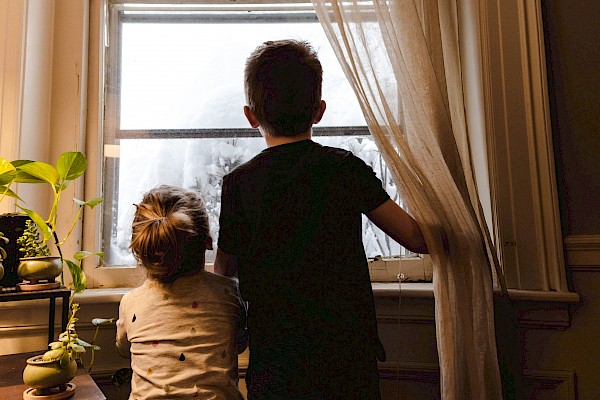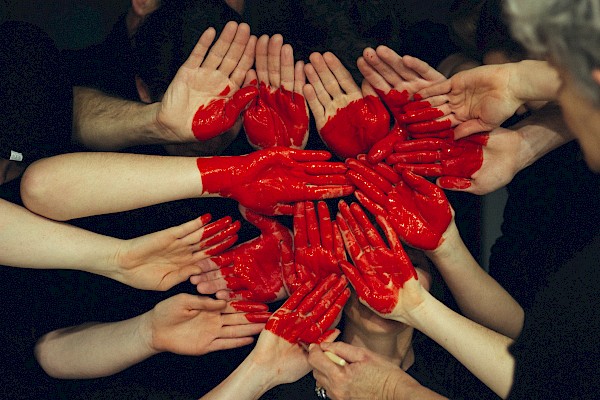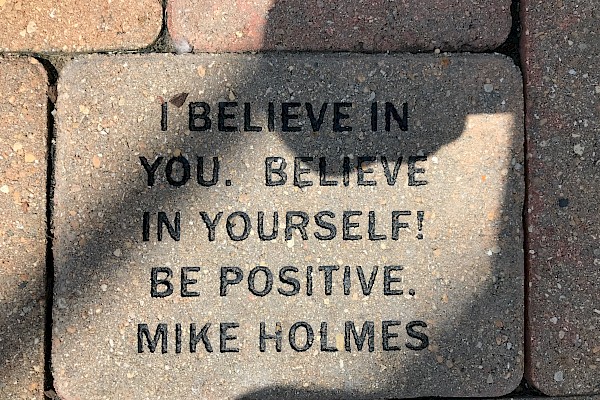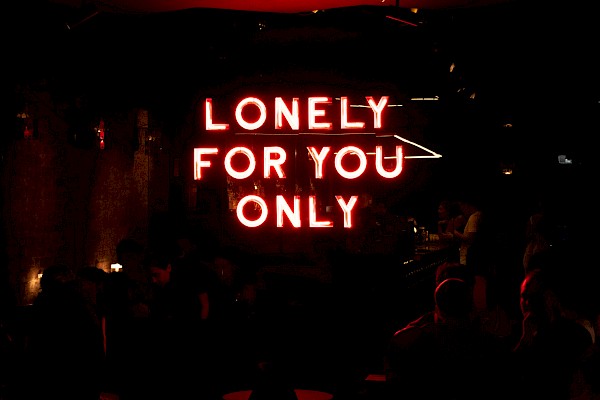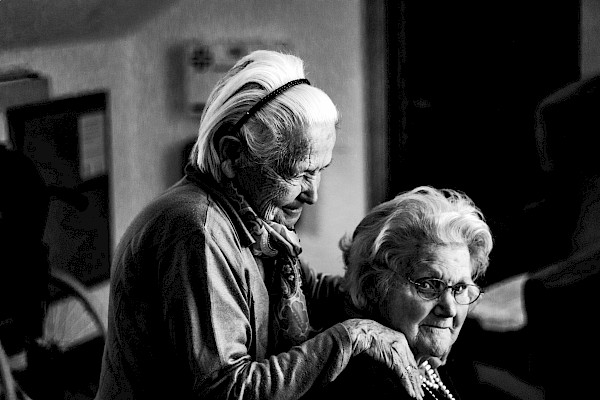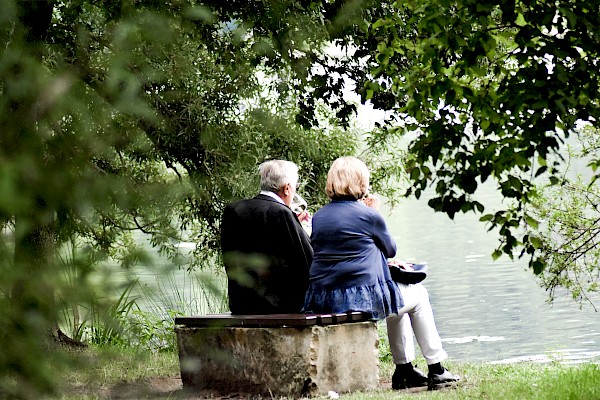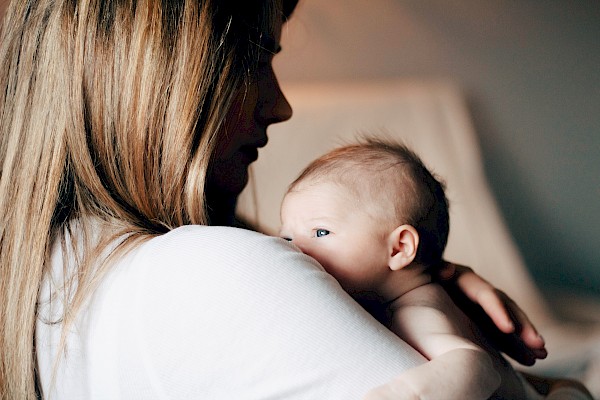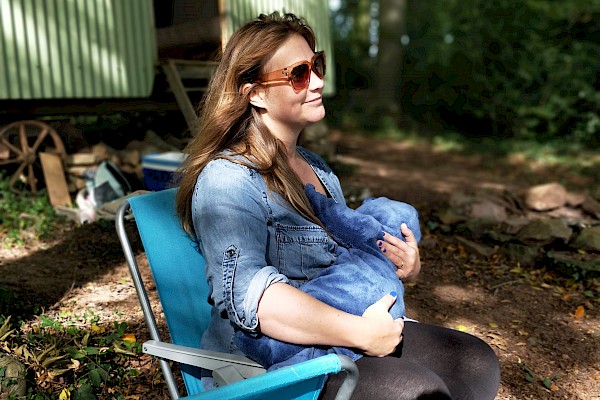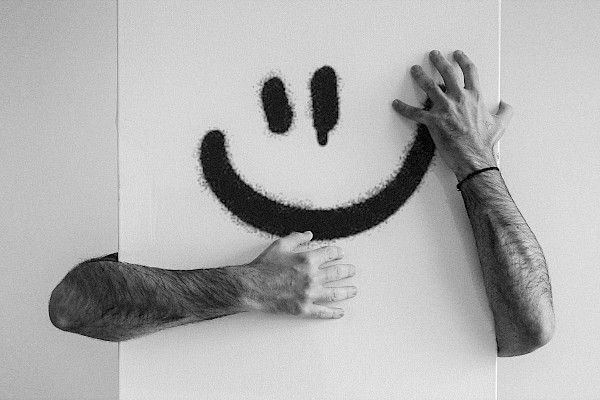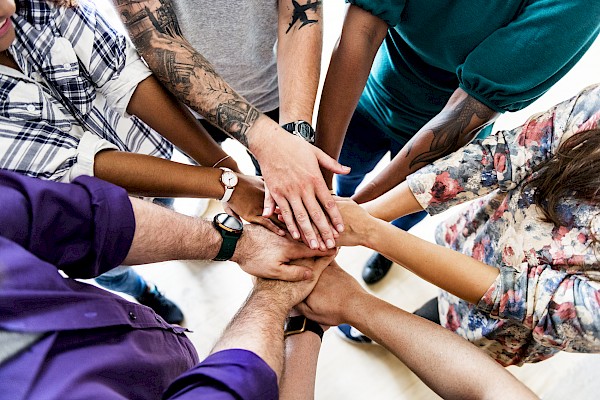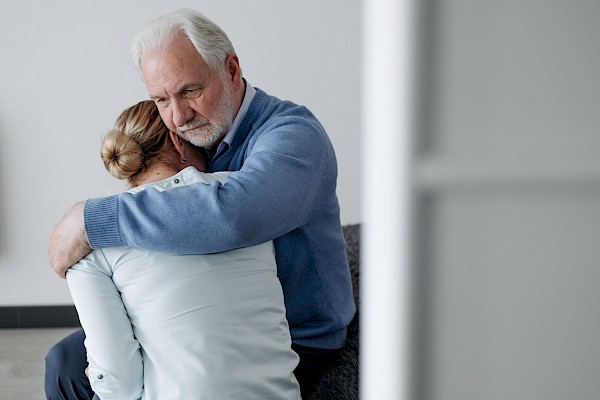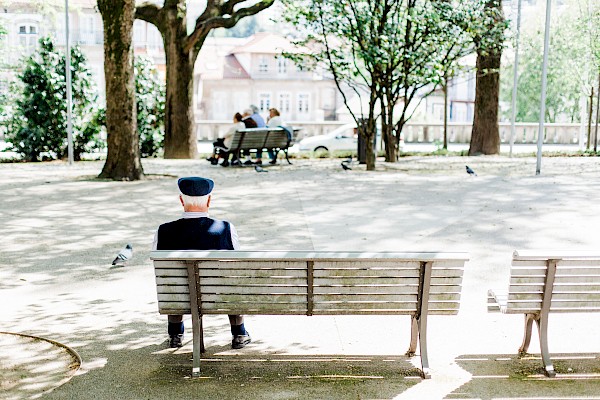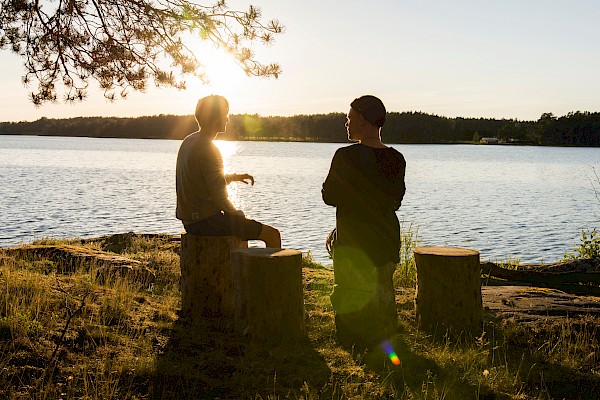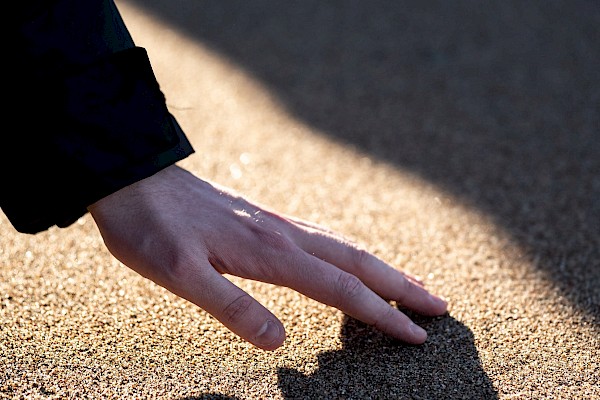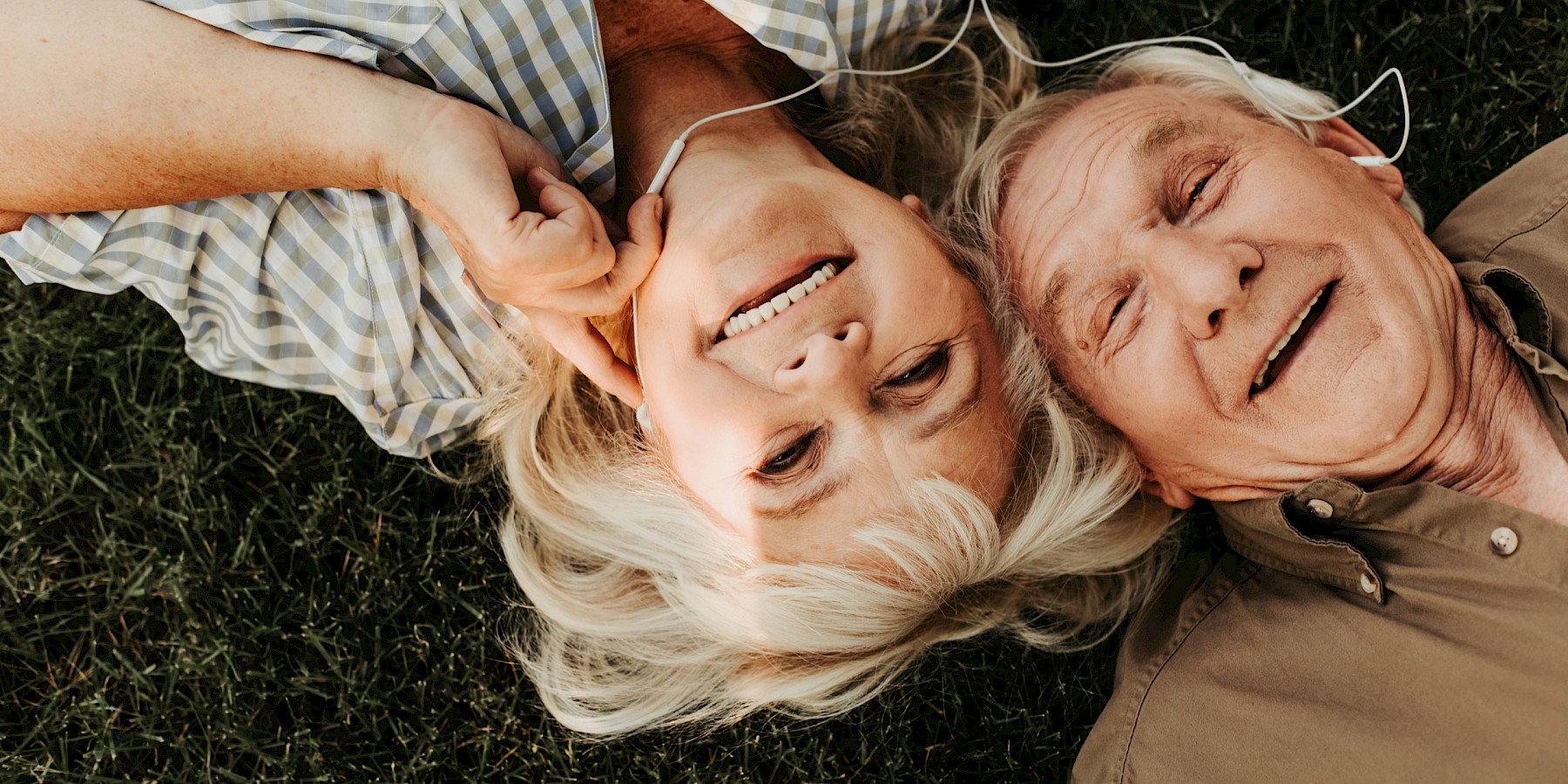
Humans are social beings,
naturally adapted to form relationships.
Both positive relationships and social support have a demonstrably positive influence on our health.
From birth on, we are involved in more-or-less permanent social relationships. Although the size and composition of our social networks change over the course of our lifetimes, our need for social contact is lifelong. Good interpersonal relationships and social support give us the emotional and practical anchor we need. Being involved in a social network of understanding and mutual commitment makes us feel cared for, loved, respected, and valued. This is a significant factor in protecting our physical and mental health. Additionally, respectful, supportive relationships frequently encourage us to learn healthier behaviours.
Healthy together
Good relationships, including friendships and partnerships as well as family or network support (e.g., in a club, in the neighbourhood), have a positive effect on our health. Studies show that people with good networks, who receive sufficient support and feel invested in respectful relationships, have a demonstrably lower risk of different illnesses such as cardiovascular diseases and infections. Additionally, people with good relationships often have a healthier lifestyle and are less susceptible to depression and anxiety. Building bridges, establishing friendships and nourishing social relationships is worth it!
Social relationships are not always easy. In situations such as relationship problems or marital breakdown, family conflicts, harassment or caring for relatives, you can reach your personal limit and see a relationship as detrimental. In this situation, it is important to set boundaries and, if necessary, to get help.
Physical closeness
Physical closeness and time spent with friends, partners and family must also not be forgot-ten in this digital age. Physical contact with people you trust is and will always be irreplacea-ble for our health – like air for breathing. For example, when we hug each other, our bodies release oxytocin, a hormone that promotes positive social interaction. It can strengthen the bond between two people, for example, or reduce anxiety and stress, alleviate aggression and boost empathy. Although this represents only a fraction of all the positive effects of phys-ical closeness on our health, it is clear how important other people are for us and how im-portant we are for them. By taking our problems to our social relationships and caring for our social contacts, we are doing something good for our health.
Das Beste, woran man sich im Leben festhalten kann,
ist aneinander.

Tips and tricks
Pick up the phone and call someone you haven’t seen or spoken to for a long time. Arrange to meet and spend some time together.
Start some regular habits with friends. For example, meet your girlfriends for brunch on the first Saturday of the month, or go and play squash once a week with a friend.
If you think something nice about somebody, tell them. Compliments aren’t paid often enough, although everybody likes receiving them.
Use social media and your smartphone consciously. For example, set your phone to show you your daily screen time. Are you surprised, even horrified, at the amount? Set priorities, so that you spend less time on social media and more in real life.
What’s available in Zug Canton
-
Clubs
In Zug Canton there are a great number of clubs and societies that allow people to pursue their special interests and build up a social network at the same time. Would you like to estab-lish more social contacts and at the same time pursue a passion, such as singing, music, art, nature, theatre or sport? Or do you want more contact and interaction with the other inhabit-ants of your quarter? Then maybe you will find a suitable club, society or neighbourhood as-sociation in the list of clubs.
Zug Canton list of clubs -
For young people
Youth work in Zug Canton provides many opportunities to meet your peers and spend your free time working together on an exciting project or making your own ideas and wishes a re-ality. At the youth club, you can meet your friends or organise a party. Various options can be found on the feel-ok.ch website. You can search directly for things that interest you, or look at what is available where you live.
Leisure activities for young people -
Pfadi – for children and young people
Pfadi is one of the most important clubs for children and young people, and it is open to boys and girls over the age of 5. Would you like to find new friends, run around in the open air, have fun and, at the same time, learn how you can orient yourself in a group with others in the environment? If so, Pfadi could be for you. Several municipalities in Zug Canton have a Pfadi. The cantonal association of Zug Pfadis provides a list of all the Pfadi branches in the canton.
Pfadi in Zug Canton -
Jungwacht Blauring – for children and young people
Jungwacht Blauring is Switzerland’s largest Catholic club for children and young people. Like Pfadi, Jungwacht Blauring groups (called “flocks”) provide children and young people with many age-appropriate leisure activities. The flocks are open to everyone, regardless of abil-ity, origin or religion. Would you like to spend your free time outdoors and find new friends? If so, Jungwacht Blauring could be right up your street. Jungwacht Blauring in Zug Canton pro-vides a list of all the canton’s flocks.
Jungwacht Blauring Zug Canton -
Meet-ups for the over-60s
Are you over 60 and would you like to establish new social contacts and, for example, play cards or chess at a convivial gathering, or join a knitting circle? Then the meet-ups (Treffs), the Tavolata or the Hopp-la-Fitness courses run by Pro Senectute Zug could be the very thing. You can join at any time and you do not usually need to book.
Pro Senectute Zug – free meet-ups Pro Senectute Zug – TAVOLATA Hopp-La-Fitness -
Zug for carers
In Zug Canton, thousands of relatives take care of the people they love. Are you a carer for someone too? Then you have two tasks straight away. On the one hand, you are helping an ill or incapacitated person, and on the other, you need to take care of yourself too, so that you feel good and remain fit. To help you with the burden, and to provide you with support and advice, we have launched the online platform “Zug for carers” in Zug Canton, for you. It summarises the support options in Zug Canton.
Zug for carers -
The single parents’ association
Are you a single parent and would you like to establish contact with other single parents? The Single Parents’ Association (IG) of the Zug Canton Women’s Association brings single par-ents together, so they can support each other and exchange ideas and experience. The chil-dren can play together while their parents chat and swap stories. Does this appeal? Every-one is very welcome at the meetings, whether you are a single mother or a single father, a weekend mum or a weekend dad. The occasions are also free or cheap where possible, and you don’t need to be a member to join in.
Meetings for single parents -
By mothers, for mothers – Femmes-Tables
At Femmes-Tables, women with mostly immigrant backgrounds come together for private or institutionally organised discussion groups in which they grapple with questions about every-day life, bringing up children, and health. You will also be able to exchange experiences and advice with other mothers in your native language. The eff-zett specialist centre hosts Femmes-Tables in Zug Canton. Interested? Then you can find further information on Femmes-Tables directly on the eff-zett specialist centre website.
Femmes-Tables -
Gemeinsam Znacht Zug
“Gemeinsam Znacht Zug” (Zug Supper Club) came into being because social relationships are hugely important for the mental health of refugees, and because social integration is not easy for many of them. The supper club creates the opportunity for people to get to know each other, dismantling barriers and connecting people from different cultures. That is why people from Zug Canton invite refugees round for a meal. You don’t need a gourmet menu. Just a meet-up for coffee and cake will create the space for an encounter and a conversa-tion. Would you like to give refugees a little piece of home, and learn about their culture at the same time? Then register as a host. Are you a refugee in Zug Canton and would you like to get to know the locals a little better? Then register as a guest.
Gemeinsam Znacht Zug (Zug Supper Club) -
Zug Host Programme
Every year, approximately 2500 people move to Zug Canton from other countries. Most of them do not have any social contacts when they arrive. In the Zug Host Programme, natives of Zug volunteer to provide support to new arrivals once they are here. Do you know your way around Zug, would you like to make new contacts and also support someone so they can settle in well and quickly? Or are you a newcomer to Zug Canton and would you like to get to know new people, and get your bearings in your new home? You will find further infor-mation about the Zug Host Programme on Migration Zug’s website.
Zug Host Programme -
Zug Queer Meet-up
The Queer Zug club provides a platform for queer people to get to know each other, ex-change tips and experience, and enjoy sociable moments. The monthly Queer Zug meet-ups are open to everyone and are a chance to spend a pleasant evening in conversation, regard-less of age. You can find more information about Queer Zug on the club’s website.
Queer Meet-up Zug -
Zug people helping Zug people
The Facebook group Zuger helfen Zugern (Zug people helping Zug people) organises and promotes helping your neighbours in a straightforward way. You can connect with people and exchange things and ideas, network together and help each other.
Zuger helfen Zugern (Zug people helping Zug people) -
meet-up.com – Zug
meet-up.com is a general platform for finding and building up local associations. You can use the platform to meet new people, find support, learn new things or to leave your own comfort zone and pursue interests with other people. You will find various groups for different things in the Zug area on meet-up.com.
Meet-up groups in and around Zug -
Churches
All over the world, religions bring people together. There are many reformed and Catholic churches in the canton, all offering space for sharing and fellowship.
Zug Catholic church – programme The Reformed church of Zug – events -
Social support and advisory services
Your own social network of family, friends and acquaintances is hugely important for mental health. But there are definitely times in life when support from your personal circle is not enough. In such situations, it is important to get help and advice from outside. Therefore there are various different advisory services in Zug Canton. You can find them all, arranged alpha-betically, in the cantonal Social Services directory. So that you can quickly find what you are looking for, you can filter the services by key words, such as outpatient care and home sup-port, budgeting and debt advice, marital and couples counselling/mediation, cheap shopping, social advice and residential housing/assisted living.
Zug Canton Social Services Directory The eff-zett specialist center Triangel Counselling -
Voluntary work
A commitment to voluntary work is an important contribution to social cohesion and the quali-ty of life in Zug Canton. Voluntary work covers both voluntary and pro bono commitments, to include all forms of non-remunerated, autonomous employment outside your own family and done within a time limit. Above all, it is about giving other people joy and time.
Benevol Zug job board for volunteers
-
References
Bachmann, N. (2018).
Soziale Ressourcen: Förderung sozialer Ressourcen als wichtiger Beitrag für die psychische Gesundheit und eine hohe Lebensqualität. Bern: Gesundheitsförderung SchweizHasler, G. (2015).
Resilienz: Der Wir-Faktor, Gemeinsam Stress und Ängste überwinden. Schattauer Verlag.Primack, B. A., Shensa, A., Escobar-Viera, C. G. et al. (2017).
Use of multiple social media platforms and symptoms of depression and anxiety: A nationally-representative study among U.S. young adults. (69). Computers in Human Behavior.Reif, J. A. M., Spiess, E. & Stadler, P. (2018).
Effektiver Umgang mit Stress. Berlin: Springer.Uchino, B. N. (2006).
Social Support and Health: A Review of physiological processes potentially underlying links to disease outcomes. (29, 4). Journal of Behavioral Medicine.
 subscribe to newsletter
subscribe to newsletter
